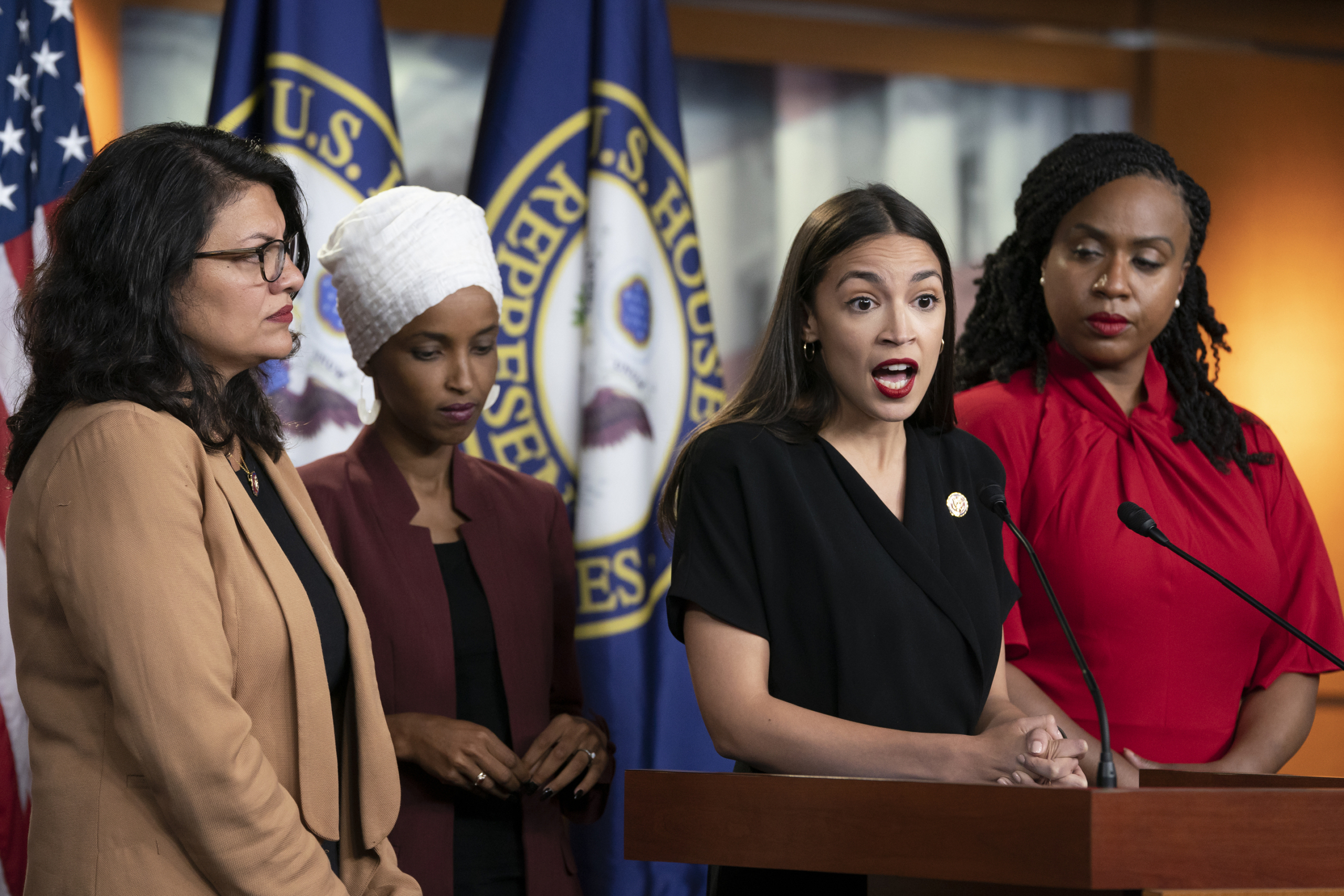Sign up for The Media Today, CJR’s daily newsletter.
Almost a year ago Alexandria Ocasio-Cortez, a member of the Democratic Socialists of America and a former bartender, became the youngest woman ever elected to Congress after she unseated Joe Crowley to represent Queens and the Bronx.
Her victory, understandably, made headlines. A socialist! A bartender! A young person! A woman! We do not read these words in stories about Congress every day.
Then Ocasio-Cortez got to Washington and quickly became allied and associated with three other female freshmen members—Rep. Ayanna Pressley from Massachusetts, Rep. Ilhan Omar from Minnesota, and Rep. Rashida Tlaib from Michigan. They became known as the squad. The attention—and even the media’s insistence on using the cutesy nickname—was somewhat understandable. They say things like “motherfucker” and “impeach,” sometimes in the same sentence.
ICYMI: When New York Times reporting is weaponized
But a year has gone by, and still, somehow, CNN treats these four duly elected members of Congress as at best an anomaly and at worst an annoyance. Consider, for example, a segment that ran late last month. The accompanying article online is titled “These five freshmen women changed history by becoming unlikely leaders on impeachment,” and is about five more moderate women—Elissa Slotkin of Michigan, Abigail Spanberger of Virginia, Chrissy Houlahan of Pennsylvania, Mikie Sherrill of New Jersey, and Elaine Luria of Virginia —who refer to themselves as badasses. (I could not help but note that all are also white.)
These five women called for impeachment relatively late—compared to, say, Tlaib, who came into office vowing to impeach the president. But the segment wasn’t on Tlaib. Then, in a separate interview, Jake Tapper asked Slotkin whether members of Congress like Tlaib “undermine the seriousness with which you and other colleagues of yours want to proceed”.
“I know that my district does not want me participating in the kind of vitriol that they see coming out of Washington generally so that’s not what I’m going to personally be doing,” Slotkin replied. The piece and segment were criticized by, among others, the Intercept for “erasing” the women who pushed for impeachment. And it did. But taken together with Tapper’s question, it was worse than erasure—it was dismissal.
Or take, as another example, John King’s comments after it was announced that three of the four squad members—Ocasio-Cortez, Omar, and Tlaib—would endorse Bernie Sanders for president. (Tlaib actually ended up endorsing Sanders later on; Pressley, who is from the same state as Sen. Elizabeth Warren, has not yet made an endorsement.)
“They are more of the younger, fresher face, more aggressive, more liberal,” King said. “Less compromising. Less talk about working with Republicans. And one of the questions for Bernie Sanders has been, in a very different race this time, can he find a lane to victory? There is no doubting fundraising, there is no doubting the depth of his support across the country.” The endorsements, he said, “will certainly help him. But it will also, I think … have some of the other candidates say, ‘wait a minute. Is this too far left? Is it too uncompromising? Is it too urban? Is it too internet? Does the Democratic Party need to find a broader audience?’”
King was right that some candidates have indeed been making the argument that Democrats need to win in purple districts and states, and not only deep blue ones. But the way in which he articulated it was bizarre. Is it too urban? What are you really asking here, John King?
Tlaib and Omar are from Michigan and Minnesota—and they aren’t less from those places because they’re from cities. (Sanders, incidentally, won both of these primaries in the last Democratic primary; Hillary Clinton famously lost Michigan in the general election.)
The “is it too internet” comment is even stranger. Ocasio-Cortez has a massive Twitter following, but she didn’t win her primary on Twitter; she pulled off a win that shocked many pundits in real, actual life. So did Tlaib and Omar (who won her election by a whopping 56 percent). The fact that candidates and causes may be popular in certain segments of the population on Twitter doesn’t mean that they aren’t real, and saying “Twitter is not real life” is not a substitute for engaging with policies and the politicians pushing them.
CNN clearly understands on some level that these four members of Congress are influential. If it didn’t, it wouldn’t run stories like, “Ilhan Omar says Biden isn’t progressive enough to be Democratic presidential nominee” or write of the endorsements for Sanders, “The pick-ups are huge. Some Democratic strategists think that outside of the Obamas, Ocasio-Cortez represents the most influential potential endorsement of the 2020 primary race.”
It’s yet to become fully apparent, at least to this viewer, that CNN appreciates why “the squad” is influential. It isn’t because they make a lot of noise, or because Ocasio-Cortez is much better at Twitter than any other elected member of Congress, or because they curse. It’s because they’ve managed, in their first year on the Hill, to contribute to a change in the kinds of conversations we’re having on climate change, health care, foreign policy, education—the list goes on.
To pretend otherwise is disingenuous. It’s time for CNN to change its conversation, too.
Editors note: CJR has appointed its own outside public editors for four vital news outlets — The New York Times, The Washington Post, CNN and MSNBC — that currently lack any public ombudsman. You can reach them at publiceditors@cjr.org. (Any messages will be treated as off-the-record unless otherwise agreed.)
ICYMI: Why Netflix is facing a lawsuit over one of the streaming giant’s miniseries
Has America ever needed a media defender more than now? Help us by joining CJR today.



